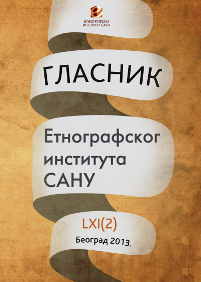Градска музика на Косову и Метохији у истраживањима српских етномузиколога током XX века
Urban Music from Kosovo and Metohija in the Researches of Serbian Ethnomusicologists up to the Second Half of the Twentieth Century
Author(s): Marija DumnićSubject(s): Customs / Folklore
Published by: Етнографски институт САНУ
Keywords: Kosovo and Metohija; urban folk music; ethnomusicology in Serbia.
Summary/Abstract: Folk music of Serbs from Kosovo and Metohija is considered to be archaic in popular discourse. From the scientific side, that is supported by the ethnomusicological printed and sound recordings, which are one of the first sources about Serbian music folklore. Ethnomusicology in Serbia is based on the results of music ethnography of the nineteenth and the twentieth century, and because of that, it is primary focused on rural tradition. Also in the last years’, popular music arrangements of some of these songs are often, whereby music from Kosovo and Metohija is usually perceived as the rural heritage. Nevertheless, music recorded during pioneer ethnomusicological fieldworks in Kosovo and Metohija is mostly noted in the cities, in organized “unauthentic” situations, and the performers were craftsmen, traders and teachers. Although in the latter ethnomuscological literature music classification according to the ritual background was common, the most of the songs recorded on Kosovo and Metohija have not (strict) ritual function and subject matter. The analysis of the Kosovo and Metohija songbooks of the eminent ethnomusicologists from Serbia proved that urban folk music was very present in the field, but troublesome for regular ethnomusicological classification and interpretation, and also that there were several informants with urban settlement who performed for these ethnomusicologists plenty of folk songs. Since the first half of the twentieth century, these ethnomusicological results have had great result first half of the twentieth century, these ethnomusicological results have had great result on the popularization of Kosovo and Metohija music heritage. The main goal of this paper is to point on unjustified marginalization of the urban folklore at the ethnomusicological discourse, to illuminate the approaches of the pioneers in ethnomusicology in Serbia to the music heritage which has special significance not only in expert framework and to discuss the role of ethnomusicologist in the creation of the notion of “folk song”.
Journal: Гласник Етнографског института САНУ
- Issue Year: LXI/2013
- Issue No: 2
- Page Range: 83-99
- Page Count: 17
- Language: Serbian

